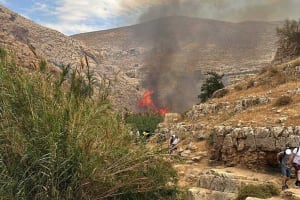If Moses taught that blood sacrifice was essential for atonement, how do Jews receive forgiveness of sins today?
And do the ancient Hebrew prophets Daniel and Isaiah provide any clues on how to receive forgiveness without a Temple in Jerusalem?

JERUSALEM—At sundown tonight – Tuesday, Oct. 4 – we begin Yom Kippur, the Day of Atonement.
In the Hebrew scriptures, the Israelites were commanded by the Lord to fast and pray and bring their sacrifices to the Temple in Jerusalem, and then to ask for the Lord’s forgiveness for all the sins they and their nation had committed that year.
According to Moses and the scriptures, only the blood sacrifice of a perfect animal – in which the one bringing the sacrifice had a truly humble and repentant heart, one filled with faith in God’s mercy and grace – would bring about forgiveness of sins.
“For the life of a creature is in the blood, and I have given it to you to make atonement for yourselves on the altar; it is the blood that makes atonement for one’s life.” (Leviticus 17:11)
“In fact, the law requires that nearly everything be cleansed with blood, and without the shedding of blood there is no forgiveness.” (Hebrews 9:22)
“Blessed is the one whose sins are forgiven, whose sins are covered.” (Psalm 32:1)
But here’s the problem modern Jews face today: How do we receive atonement for our sins in the modern age, without an operational Temple in Jerusalem?
That is, how can we make sacrifices and receive forgiveness of sins – and thus the right to enter the holiness of heaven and live with the Lord in heaven forever in His holy and perfect world – without being able to sacrifice a perfect lamb at the Temple in Jerusalem, where the Lord designated all sacrifices to occur?
The destruction of the Temple by the Romans in 70 A.D. was a huge blow to Judaism.
Why?
Because it deprived Jews of the place to receive atonement from God.
For 2,000 years, we haven’t had the ability to have our sins forgiven in the manner required by the Lord in the Bible.
Fortunately, the Lord spoke the answer through the Hebrew prophet Daniel hundreds of years before the Second Temple was destroyed.
In Daniel 9:24-26, we learn three critical truths:
Daniel told us that the Messiah (“Anointed One”) would come at a certain time in history “to atone for wickedness” and “to bring in everlasting righteousness.”
Daniel also told us that when the Messiah came, he would be “cut off and will have nothing.”
Then Daniel foretold that Jerusalem and the Temple would be destroyed after the Messiah was “cut off” — specifically, Daniel prophesied, foreign invaders “will come and will destroy the city and the sanctuary.”
Think about that for a moment.
Daniel told us something extraordinary.
The coming Messiah would be “cut off” and bring atonement for our sins, and He would come before the Temple would be destroyed.
In retrospect, that makes sense, right?
Why would the Lord take away the Temple unless He was going to provide a new way for atonement, the very “new covenant” He spoke of through the Hebrew prophet Jeremiah?
What’s more, the Hebrew Prophet Isaiah gave us additional important details about the Messiah’s role in bringing each of us atonement from our sins.
Consider these passages from Isaiah 53.
He was despised and rejected by men, a man of sorrows, and familiar with suffering. Like one from whom men hide their faces, he was despised, and we esteemed him not. Surely he took up our infirmities and carried our sorrows, yet we considered him stricken by God, smitten by him, and afflicted. But he was pierced for our transgressions, he was crushed for our iniquities; the punishment that brought us peace was upon him, and by his wounds we are healed. We all, like sheep, have gone astray, each of us has turned to his own way; and the LORD has laid on him the iniquity of us all. He was oppressed and afflicted, yet he did not open his mouth; he was led like a lamb to the slaughter, and as a sheep before her shearers is silent, so he did not open his mouth
By oppression and judgment he was taken away. And who can speak of his descendants? For he was cut off from the land of the living; for the transgression of my people he was stricken. He was assigned a grave with the wicked, and with the rich in his death though he had done no violence, nor was any deceit in his mouth.
Yet it was the LORD’s will to crush him and cause him to suffer, and though the LORD makes his life a guilt offering, he will see his offspring and prolong his days, and the will of the LORD will prosper in his hand. After the suffering of his soul, he will see the light of life and be satisfied; by his knowledge my righteous servant will justify many, and he will bear their iniquities. Therefore I will give him a portion among the great, and he will divide the spoils with the strong, because he poured out his life unto death, and was numbered with the transgressors. For he bore the sin of many, and made intercession for the transgressors.
What’s intriguing to me is that the Jews of the First Century (B.C.) actually believed the Messiah would one day come to earth and die as a “suffering servant” – as an atonement for sins and the redemption of Israel – and would then rise from the dead on the third day.
That’s the conclusion of Dr. Israel Knohl, a respected professor and Dead Sea Scrolls expert at Hebrew University.
He argued that the death and “third day” resurrection of the Messiah is, in fact, a distinctly Jewish concept that actually pre-dates the emergence of Christianity.
Knohl based on his conclusions on many years of research and recently analyzed archaeological evidence, including a previously unstudied Dead Sea Scroll.
Indeed, Knohl has argued that this notion of the Messiah rising on the third day is a pre-Christian concept that dates back to before the birth of Jesus in Bethlehem Ephratah.
I had the opportunity to sit and discuss this with Knohl at length a few years ago and it was an absolutely fascinating conversation.
I first heard of him when he drew worldwide media attention several years ago for his research, including a major article in The New York Times and several articles in Biblical Archaeology Review — see and here and here.
The Times story, which ran under the headline, “Ancient Tablet Ignites Debate on Messiah and Resurrection,” begins as follows: “A three-foot-tall tablet with 87 lines of Hebrew that scholars believe dates from the decades just before the birth of Jesus is causing a quiet stir in biblical and archaeological circles, especially because it may speak of a messiah who will rise from the dead after three days. If such a messianic description really is there, it will contribute to a developing re-evaluation of both popular and scholarly views of Jesus, since it suggests that the story of his death and resurrection was not unique but part of a recognized Jewish tradition at the time. The tablet, probably found near the Dead Sea in Jordan according to some scholars who have studied it, is a rare example of a stone with ink writings from that era — in essence, a Dead Sea Scroll on stone.”
The tablet has been named by scholars as “Gabriel’s Revelation” because it suggests that the angel Gabriel was instructed by God to direct that the Messiah be raised from the dead on the third day.
The stone tablet was discovered several decades ago and is owned by a Israeli-Swiss Jewish man by the name of David Jeselsohn who didn’t understand its significance when he purchased it.
The Times article was published in 2008.
Knohl then published a book about all this in 2009 entitled, “Messiahs and Resurrection in 'The Gabriel Revelation.'”
That was a follow up to his previous book, "The Messiah Before Jesus: The Suffering Servant of the Dead Sea Scrolls" (first published in Hebrew in 2000 and then in English in 2002).
In the book, Knohl explained the various Jewish theories about the Messiah, including the idea of a “Messiah son of David” who will come as a reigning king on the earth like King David was, and a “Messiah son of Joseph” who will be rejected by his brothers, mistreated, left for dead but will eventually reappear and save not only the nation of Israel but the world like Joseph did in the book of Genesis.
This Yom Kippur, I commend these articles – and Knohl’s books – to your attention. The books, along with Daniel 9 and Isaiah 53 provoke several important questions:
Did the ancient Hebrew prophecies really foretell that the Jewish Messiah would die as an atonement for our sins but was also supposed to be buried and raised from the dead on the third day?
Did the Jews in the first century really believed that the coming Messiah would be rejected by the religious leaders of the day in order to be killed on Passover and raised from the dead on the third day, on the Feast of First Fruits?
If so, why should this matter to you and me?

Joel C. Rosenberg is the editor-in-chief of ALL ISRAEL NEWS and ALL ARAB NEWS and the President and CEO of Near East Media. A New York Times best-selling author, Middle East analyst, and Evangelical leader, he lives in Jerusalem with his wife and sons.














